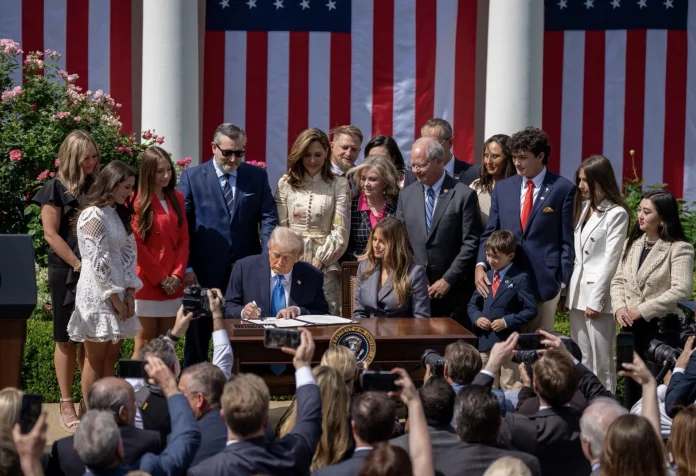The United States enacted the ‘Take It Down Act’, making the distribution of non-consensual intimate images — including AI-generated “deepfakes” — a federal crime
US President Donald Trump has signed the ‘Take It Down Act’ making posting “revenge porn” — whether real or generated by artificial intelligence — a federal crime.
The ‘Take It Down Act,’ passed with overwhelming bipartisan congressional support, criminalizes non-consensual publication of intimate images, while also mandating their removal from online platforms.
It addresses the growing concern over the misuse of technology to exploit individuals, particularly through the sharing of explicit content, without consent.
Key Provisions of the Take It Down Act
Criminalization of Non-Consensual Sharing: The Act makes it a federal offense to knowingly distribute or threaten to distribute intimate images without the subject’s consent. This includes both real and AI-generated content.
Penalties: Violators face up to two years in federal prison for offenses involving adults, and up to three years for those involving minors.
Platform Responsibilities: Social media platforms and websites are mandated to remove flagged non-consensual content within 48 hours of notification by victims.
Enforcement: The Federal Trade Commission (FTC) is empowered to enforce compliance, ensuring that platforms adhere to the removal requirements.
Legislative Background
Prior to this federal law, 49 states had their own statutes addressing revenge porn, with South Carolina being the exception. The Take It Down Act represents a unified federal approach to combat the issue nationwide.
The bill received overwhelming bipartisan support, passing the House with a 409–2 vote and the Senate unanimously. It was co-sponsored by Senators Ted Cruz (R-Texas) and Amy Klobuchar (D-Minnesota).
Advocacy and Support
First Lady Melania Trump played a significant role in advocating for the bill, aligning it with her “Be Best” initiative focused on children’s well-being and online safety. She made history by co-signing the bill alongside President Trump during the Rose Garden ceremony.
Public Reaction
The law has been lauded by victims’ rights groups and many in the tech industry as a necessary step to protect individuals from digital exploitation. However, some digital rights organizations have expressed concerns about potential implications for privacy and free speech.
The Take It Down Act marks a significant federal commitment to addressing the challenges posed by technological advancements in the realm of personal privacy and consent.
ALSO READ:





